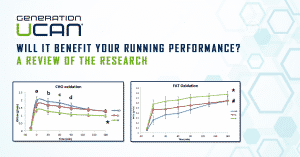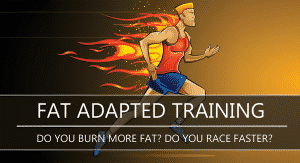“Bonking” in a marathon is a miserable experience.
Bonking, or “hitting the wall” as it is also known, is a well-known phenomena among marathon and ultramarathon runners which occurs when your body runs out of sugar to burn.
Sugar, stored in your liver and muscles bound into large chains called glycogen, is the prime fuel for a distance runner. While your body can burn fat directly for energy, it tends to prefer glycogen, as it is easier to burn. Much of the lore about the marathon being “half over at twenty miles” has to do with the fact that this is about as long as the average person’s muscle glycogen stores will last.
In this article, we’re going to look at the science of “bonking” so you better understand what might be going on and develop a a specific nutrition strategy to help you run to your absolute best on race day.
The science of glycogen depletion
An intriguing computational approach to glycogen depletion, published by Benjamin Rapoport of Harvard University in 2010 illustrated that your probability of hitting the wall during a marathon is contingent on the amount of glycogen you store in your muscles, how fast you run, your pacing strategy, your body size, and your muscle mass.
There’s a lot of interplay between these variables—for example, a faster pace burns a higher percentage of glycogen vs. fat, but also allows you to cover ground faster—but the upside of all of it is that most people don’t have the glycogen reserves to make it all 26.2 miles of a marathon at a fast pace without running out of fuel.
Additionally, there’s a factor that Rapoport didn’t take into account: new research suggests that the brain anticipates glycogen depletion and slows the body down gradually to conserve energy.
While it’s well documented that actually ingesting carbohydrates improves performance in long (2+ hour) competitions,2 simply rinsing your mouth with a carbohydrate drink, then spitting it out, seems to help too. Obviously, no significant amount of sugar could make its way into your bloodstream through rinsing your mouth; the performance boost must be coming from the brain sensing that more carbohydrates are on the way.3 So it’s reasonable to propose that performance will be inhibited significantly before your body actually runs out of glycogen.
It’s a given that on race day, you’ll want to be consuming some kind of carbohydrate drink during competition. But what about during training?
Training in a glycogen depleted state
A 2011 study by Karen Van Proeyen et al. investigated the effects of training in a glycogen depleted and glycogen-replenished state using twenty young male cyclists.4 The men were split into two groups, both of which had equivalent diets and training regimens. The first group did all of their training after an overnight fast, while the second group took a carbohydrate-rich breakfast about 90min before their daily training session (a 60-90min bike ride at a fairly hard pace in the morning).
After six weeks of training, both groups had improved a similar amount on a 60-minute time trial. However, there were several changes in the “fasted” group that indicated that their bodies had adapted to more efficiently burn fat as fuel.
- First, levels of enzymes associated with fat metabolism increased significantly in the group which trained after the overnight fast, but not in the group which had a large breakfast before training.
- Additionally, their fat utilization increased throughout a range of intensities. That is, they could maintain a given pace with less reliance on glycogen, enabling them to last longer in a race without hitting the wall.
Another study (albeit of lower quality, as it used only a handful of untrained men as subjects) by Nybo et al. confirmed the findings of Van Proeyen et al.5 The subjects who trained in a fasted state in the Nybo et al. paper also increased their fat burning abilities more than the carbo-loaded subjects; furthermore, they also increased their stores of muscular glycogen.
While you might suspect that these changes would have enabled these untrained men to lose more weigh, there was no difference in the weight lost between the men who trained after an overnight fast and the men who did not.
Other factors related to training and glycogen depletion
So, it appears that doing some training in a glycogen-depleted state can be of benefit to marathon runners. But there are some important considerations to be made.
First, keep in mind that the fasted-training subjects in the Van Proeyen and Nybo studies did not get in better shape than the carbo-loaded subjects! Their improvement from training was identical; the only differences were related to fat metabolism. If you were training for a relatively short race, like a 10k or a 5k, there would be no advantage to doing long runs after an overnight fast—the race isn’t far enough for glycogen storage to become a factor.
Second, the ability to run a given pace with less reliance on glycogen does not necessarily mean your aerobic endurance has improved (i.e. your oxygen consumption at the given pace).
Finally, there is a very practical reason to practice consuming carbs before and during a long run: you have to be able to do it when you race! It definitely takes training to get used to eight or twelve ounces of sports drink sloshing around in your stomach after ten miles of running, and you definitely want to make sure you can tolerate your pre-race meal.
Setting aside some non-critical runs to be done right away in the morning (i.e. without breakfast) appears to be a good way to increase your ability to directly burn fat while running.
Recommendations and best practices
If you’ve had issues hitting the wall at 18 or 20 miles into a marathon, you should definitely consider including some fasted training in your schedule. But you should also practice eating a big breakfast and consuming a sports drink during your run at least a few times during your marathon build-up, since you’ll have to do it on race day.
If you have “dress rehearsal” workouts (e.g. a 15-miler at marathon pace, starting at the same time as the marathon and on a similar course), you’ll definitely want to be consuming carbohydrates before and during your run.
And if you’re training for something shorter, don’t sweat it—your fitness will be the most important factor.
For more information about the marathon and energy/glycogen, consider these other helpful articles we’ve published previously:
Long runs on an empty stomach or fully fueled
Why it’s important to practice your marathon nutrition strategy
How to practice your nutrition strategy









22 Responses
Glad to see you site some research on a topic that I have grappled with for many years. I came across an article in an old issue of Marathon and Beyond that made the same claim: fasting prior to running increased your ability to burn fat. According to the article two hours was minimum fast time, overnight was optimum. I experimented on my long runs with fasting and recorded my fastest race times when I followed the fasting concept.
But what they also mentioned in that article that may in fact be the key to making this a practical way to train (and even race) was that calories taken in after exercise began do not cause the GI index to increase. Thus fasting prior to starting your run and then fueling throughout your effort is really the best way to approach the long run.
Do you have any insight or studies that further support this concept? Honestly it worked wonders back when I was faithful to the fasting and I just recently returned to this idea last month. I have completed two long runs without bonking OR gastric distress post run after returning to this method.
Thanks for sharing, David. I haven’t seen any research on what happens in regards to the GI index after fasting and then while ingesting CHO while on the run. I am sure it’s out there, just haven’t seen it yet. We’ll be on the lookout and either write something new or update this article when/if we find anything.
David, they may have been referring to the fact that during exercise insulin is supressed, therefore the concept of glycemic index has no meaning. Skeletal muscles take up glucose readily via an insulin independent mechanism during exercise.
I am a big believer in the value of training in a fasted state. I do most of my runs, even my long runs of 20+ miles, early in the morning without breakfast, and only using carbohydrate sports drinks for fuel on the run. When I combined this with increased mileage, I found my best success in avoiding the “bonk” in the marathon, in a race in which I, for the first time, didn’t consume any gels and relied strictly on carbohydrate beverages.
I do long runs in a fasted state but I don’t drink only water. If you take in carbs, sugar drinks during the long run, you are not in a fasted state.
Sorry, I also forgot to mention, I fully understand too the reasoning behind the fact that training in a fasted state doesn’t lead to greater weight loss (though some studies have demonstrated that it does) – unburned glycogen turns to fat, so it still comes down to the basic “calories in” versus “calories out” equation, regardless of the ratio of fat to glycogen you burn during training.
Thanks for sharing your success with training in a fasted state, Greg. Always nice for others to hear stories of it working because training in a fastest state sucks! Also, totally agree on the above that it won’t cause weight loss. Losing weight is always calories in vs. calories out – simple as that (but simple ain’t easy).
i dont think u really do understand what he meant that no weight was lost, he said no weight was lost not fat, meaning they gained muscle not to mention they added some extra glycogen to there muscles, I highly doubt that glycogen got stored as fat as active as they r (, theres a reason itz in big bold letters!!!) i know that this post is old but i didnt want the posts to mislead ppl.
I’m a physiologist and runner and wanted to test this theory on my own running. 8 weeks before I started training for my recent marathon I did every long run after an overnight fast and only drinking water. This was a time when I was trying to drop weight and build my base. It was cool at this time so I didn’t worry about electrolyte depletion, plus my pace was slow and distance progrssively increased from 10-18 miles. They were very difficult, I felt horrible the last few miles of every run. Once I started marathon training I supplemented normally. My long runs went great. I ran only :30 slower than GMP up to 22 miles. My long run pacing strategy was high for other reasons but the point is that pace was easy to hit and I never bonked. Came time for the marathon I hit a Boston qualifying time and never bonked and in fact had to keep my pace in check the last 3 miles for fear I would blow up right at the end. Although obviously I can’t say with certainty this was the reason, it could be I was just more diligent with marathon pacing and cho supplants during but, in those fasted long runs, the body certainly adapted as the horrible feeling came later each run. Plus mentally I was able to practice handling this feeling by inducing it metabolically and not physically thus, saving wear and tear and recovery time was easier. I will do this again on my next training cycle.
Thanks for sharing your experience, Julia. Like I mentioned to Greg above, it helps to have other runners share their stories and struggles so others can know what to expect. I also follow the theory of doing my early training phase long runs fasted and then fueling like I would for a race during the big, important marathon specific long runs. Glad it works for you as well!
Is it possible for an elite HS runner running a 5 K to “bonk”. My daughter has started this in her junior and senior year. She is near collapsing at the end of these races. Iron, nutrition, and hydration are all good. She is a nationally ranked runner and trains very well. We cannot figure out what is going on???
No, “bonking” implies running out of glycogen. You have enough muscle glycogen to run for nearly 2 hours. She’s likely just running hard and/or starting too fast.
I read a lot of interesting content here. Probably you spend a lot of time writing, i know how to save you a lot of work, there is an online
tool that creates readable, google friendly articles in seconds,
just type in google – laranitas free content source
I am totally in favour of fasting before a long run. (except for race rehearsals of course!).
Here’s another proposal: perform a hard interval or tempo workout the day prior to the long run, go home, eat mainly protein and not so much of carbohydrates and then do the long run in a completely depleted state of carbs. Is this ok?
That would not be recommended Thanasis, practicing your fueling technique is the best way to prepare your body for the day of the race. We did talk about fasting before a race, and you can read about it here https://runnersconnect.net/running-nutrition-articles/carbohydrate-intake-overnight-fast/ but as you will see, we do not recommend doing a long run without fueling.
“While you might suspect that these changes would have enabled these untrained men to lose more weigh, there was no difference in the weight lost between the men who trained after an overnight fast and the men who did not.”
What about difference in body composition? Anything mentioned in the studies? There is sometimes a notion in the body building community that morning fasted low pace cardio gives a slightly better fat loss under diets. That could help the marathon runners with less excess fat in the long run, if that’s the case. + Overall health and fitness can have also some benefits implementing fasting sometimes with low glycogen storage, not correct?
Hi Patrick, all we have reported in this post are the findings we had. There was no mention of body composition, but we did have this article about heavier runners and injuries if you are interested in this area https://runnersconnect.net/running-injury-prevention/more-weight-more-injuries/
However, this post was just to show runners how to avoid the various issues that they come across during a marathon. What you are asking could be researched into in a future post. Thank you for your thoughts!